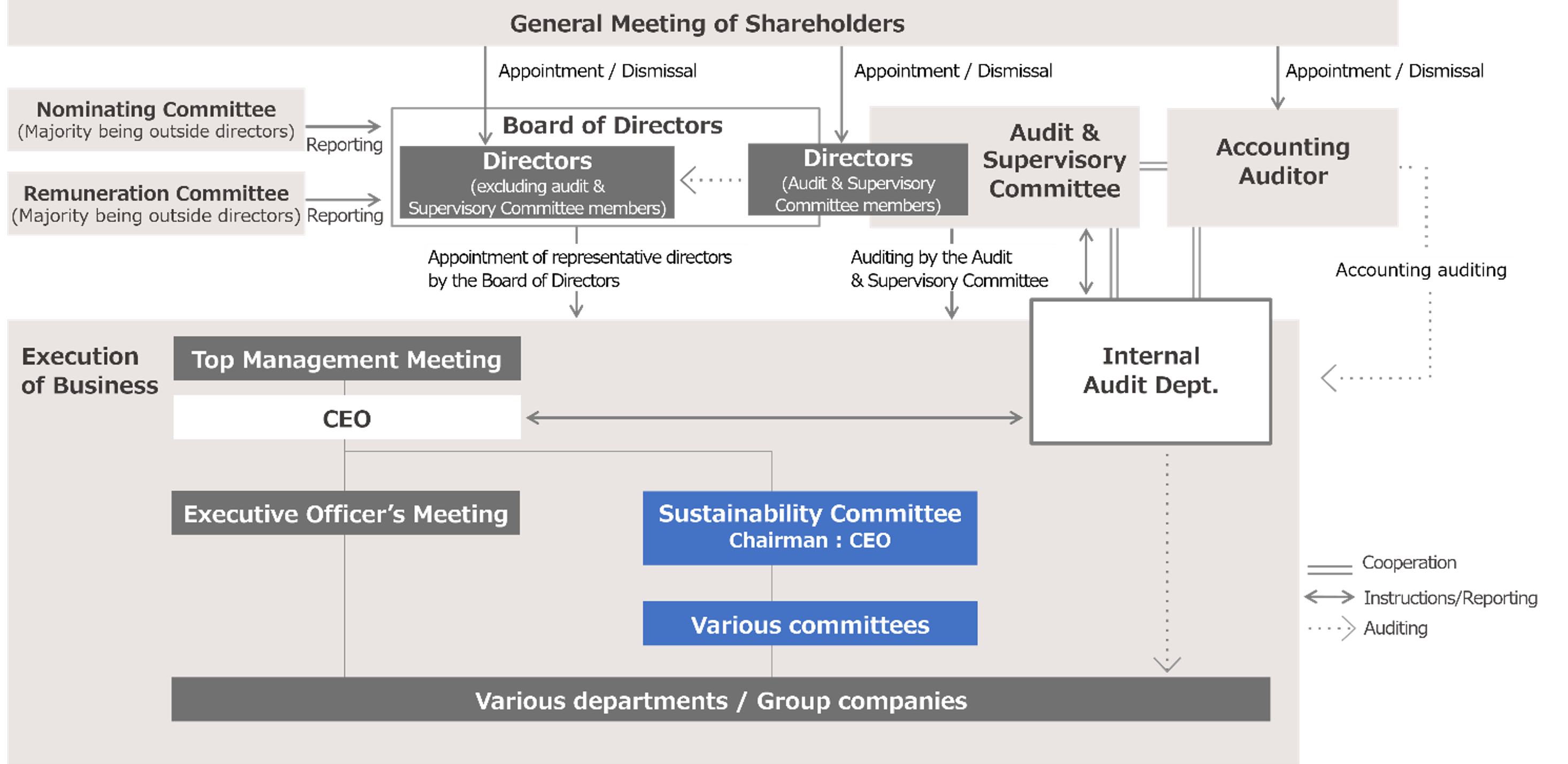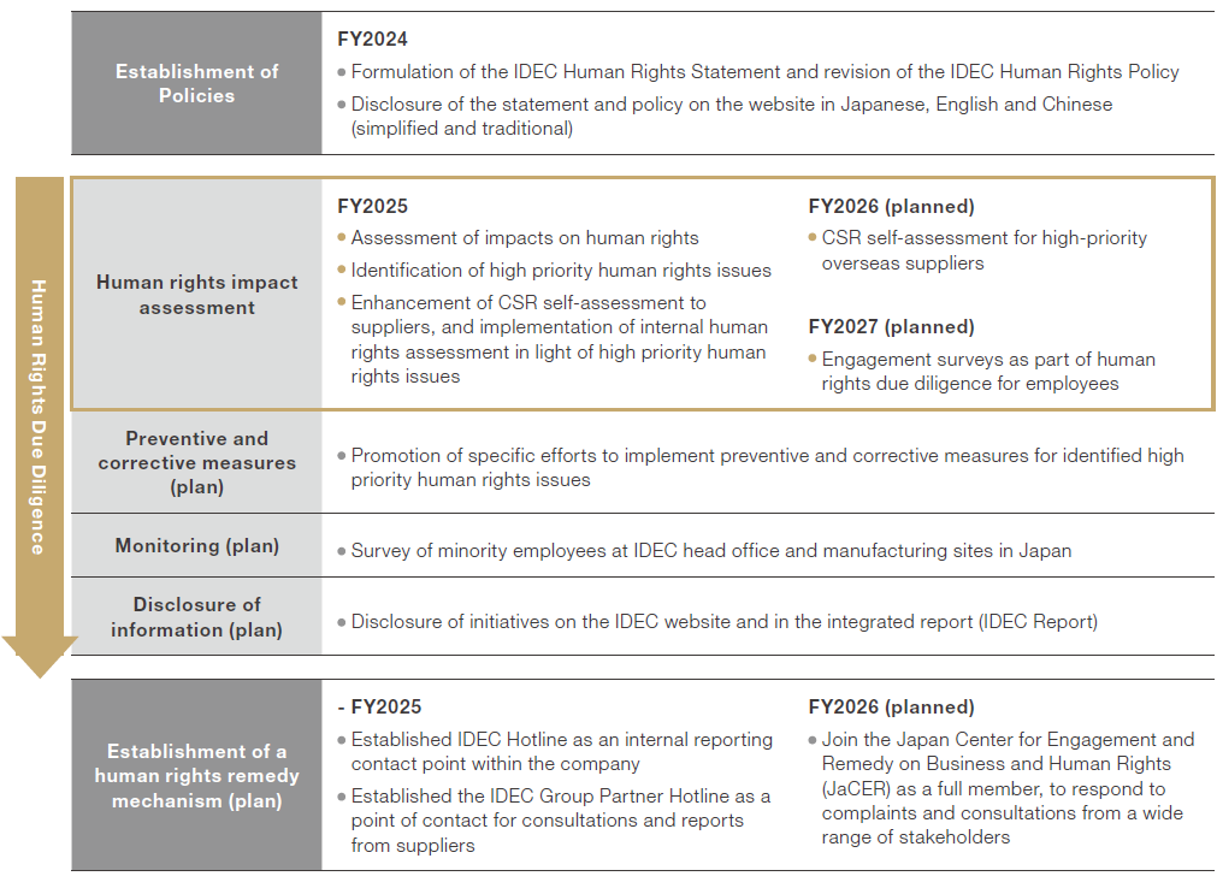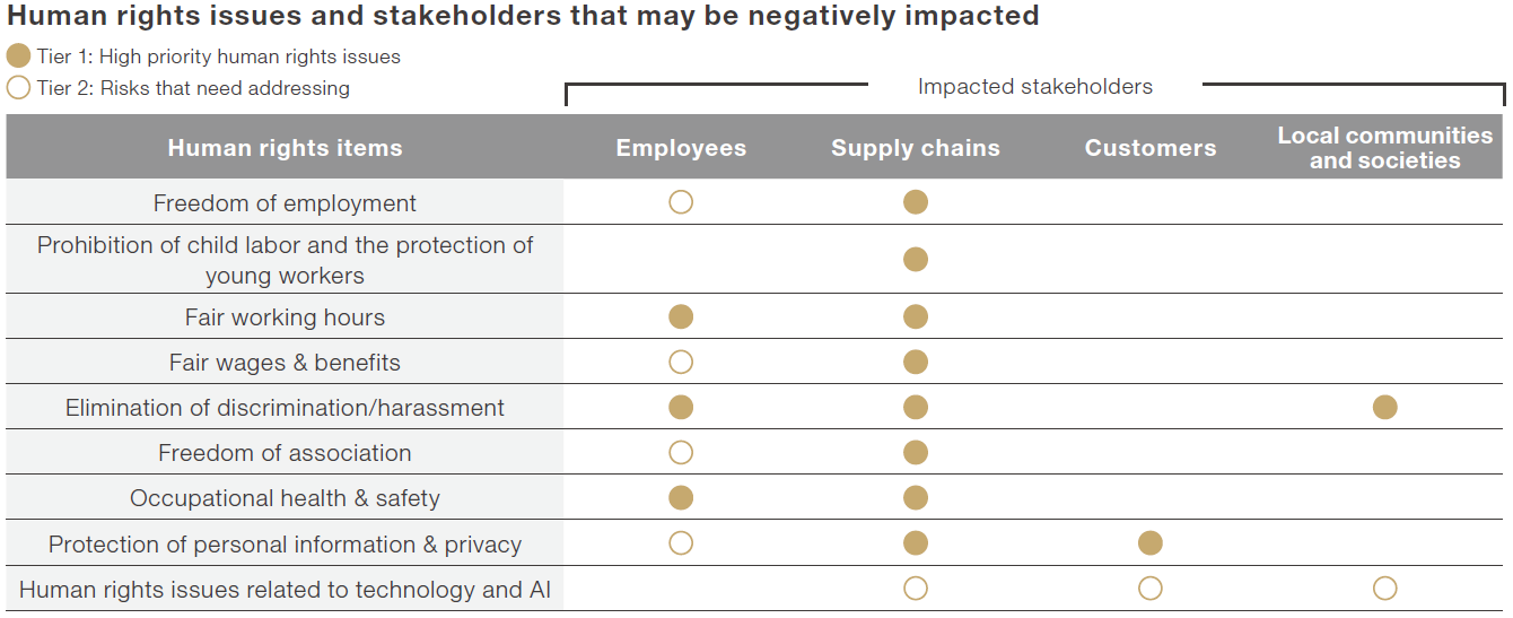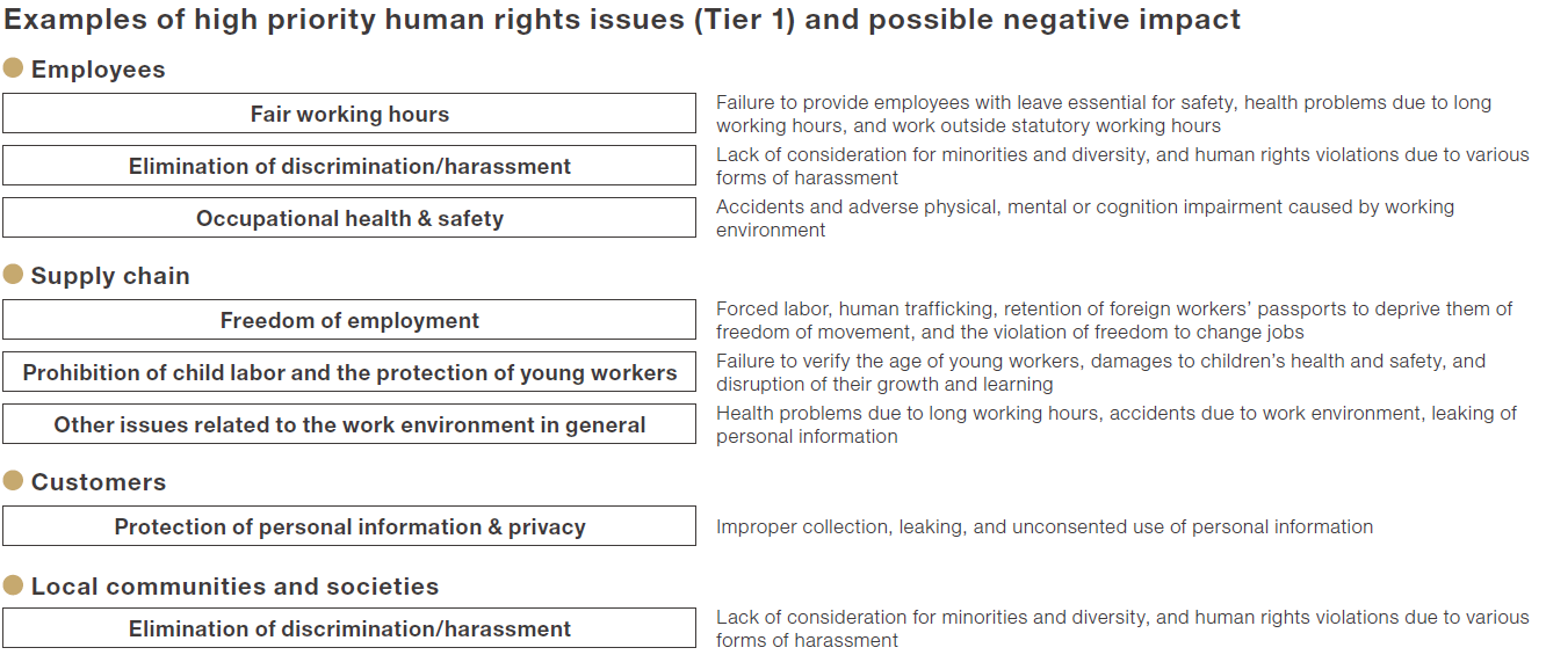Human Rights |
Human Rights Policy
IDEC Human Rights StatementThe IDEC Group’s vision is to “Pioneer the new norm for a safer and sustainable world.” We envision a safer and more sustainable world, bringing happiness and peace of mind for all. As we strive towards achieving this vision, the IDEC Group also strives to make the most of its efforts to clarify its approach to respecting human rights. We have established this Human Rights Policy (hereinafter referred to as the "policy") as an upper-level guideline, incorporating the opinions of external experts. Scope of ApplicationThis policy is applicable to all personnel of IDEC Corporation and IDEC Corporation Group Companies (hereinafter referred to as the IDEC Group) across all levels of employment; executives, fixed term/part-time employees, temporary employees, and contract employees (hereinafter referred to as employees). In addition, the IDEC Group expects all business partners, including suppliers, to understand and support the contents of this policy. We will continue to encourage and ensure that they are following and respecting the policy. Commitment to the Respect for Human RightsThe IDEC Group is fully committed to the respect for human rights in adherence with the United Nations’ “Guiding Principles on Business and Human Rights” and its referencing rules “International Bill of Human Rights” and the International Labour Organization (ILO) “Declaration on Fundamental Principles and Rights at Work”, as well as “Children’s Rights and Business Principles” and other international norms and principles relating to human rights. Human rights items significant to the IDEC Group The preceding list of human rights items is not exhaustive and is subject to updates in accordance with the results of human rights impact assessments under due diligence continuously implemented based on the policy. RemediationIn the unlikely event that the IDEC Group’s business activities, products or services have a negative impact on the human rights of our customers, local communities, or our stakeholders, the IDEC Group will provide relief/aid via appropriate procedures. If a business partner of the IDEC Group, including suppliers, is found to have a negative impact on the human rights of our stakeholders in connection with the IDEC Group’s business activities, products or services, the IDEC Group will exercise its influence over the business partner, and by doing so, seek to provide relief for those affected. Application & Observations of LawsThe IDEC Group complies with all applicable laws and regulations of its operating countries and regions. In the event that the laws and regulations of a country or region is in contradiction of internationally recognized laws and regulations of human rights, the IDEC Group will seek to prioritize and adhere to those internationally recognized. GovernanceThe IDEC Group is committed to establishing a framework for an internal “Human rights due diligence” system to fulfill the responsibility of respecting and promoting human rights. Furthermore, the IDEC Group will ensure the proper integration of this policy into its business activities by reflecting it in human resources, procurement and other related policies, procedures, and contents. Human Rights Due DiligenceThe IDEC Group will implement the following process to ensure the human rights due diligence is appropriately incorporated into all aspects of its business, in accordance with the United Nations Guiding Principles on Business and Human Rights. In situations involving stakeholders where the IDEC Group cannot control decision-making, the IDEC Group will continue to exert its influence to ensure that the policy is respected and work to avoid complicity in human rights abuses. Grievance MechanismIn addition to the IDEC Hotline for IDEC Group employees, the IDEC Group will establish a report desk that those within the company such as employees and those outside such as suppliers, business partners, members of the local community, and stakeholders can use. By creating the report desk, the IDEC Group aims to quickly identify concerns including negative impacts on human rights at an early stage, enabling us as a group to resolve the presented issues via necessary procedures swiftly. Whistleblowers’ information and the contents of their report will be kept confidential to protect their identity, and thorough protection will be provided to avoid any outcomes of unfavorable treatment or retaliation measures against the whistleblower. Stakeholder EngagementThe IDEC Group recognizes the importance of addressing the negative impacts on human rights from the perspective of individuals or groups affected. Therefore, the IDEC Group will make efforts to engage in direct dialogue with the affected groups or via a legitimate representative, such as NGOs, while additionally, considering the opinions of external experts in its efforts. Awareness and EducationThe IDEC Group will conduct appropriate education and training for all officers and employees to raise awareness of this policy within the company. Additionally, to integrate this policy effectively into the company’s business activities, it will be reflected in relevant policies, procedures, and its operations. The IDEC Group will also develop the capabilities of its personnel to ensure the effective implementation of “human rights due diligence,” and strive for a commitment to human rights throughout the supply chain by ensuring that suppliers and business partners are fully aware of the contents of this policy. Human Rights Policy Process and ReviewThe IDEC Group will continue to take into consideration societal trends, changes in the business environment, and dialogues with stakeholders, to periodically review this policy and strive to enhance efforts in respecting human rights. July 31st, 2024 Toshi K. Funaki |
IDEC Human Rights Policy
This policy is applicable to all personnel of IDEC Corporation and IDEC Corporation Group Companies (hereinafter referred to as the IDEC Group) across all levels of employment; executives, fixed term/part-time employees, temporary employees, and contract employees (hereinafter referred to as employees). In addition, the IDEC Group expects all business partners, including suppliers, to understand and support the contents of this policy. We will continue to encourage and ensure that they are following and respecting our Human Rights Policy.
1.Human Rights
1.1 Anti-discrimination & Fair Treatment
The IDEC Group respects the humanity of all individuals and does not discriminate in any way regardless of race, color of skin, age, sex, sexuality, gender identity/expression, ethnicity or nationality, disability, pregnancy, religion, political affiliation, union membership, covered veteran status, protected genetic information or marital status.
1.2 Forced Labor & Child Labor Prevention
The IDEC Group does not engage in any acts relating to forced labor, child labor, slave labor, or any forms of human trafficking. To prevent the use of child labor, candidates undergo government-issued photo ID age verification during the hiring process. If a candidate does not have any form of government-issued photo ID, multiple official documents are required to verify their age. Failure to do so will result in the suspension of their hiring process until documents are provided.
Here, the term “child” refers to any person under the age of 15, or under the age for completing compulsory education, or under the minimum age for employment in the country, whichever is greatest.
In the unlikely event that child/forced labor is discovered within company operations, the IDEC Group will undertake the following corrective measures:
Child Labor: the company will find and contact the parents of the child in question and will aid in supporting the child with completing compulsory education.
Forced Labor/Slave Labor/Human Trafficking: employee in question will be promptly relieved from work and the company will support the victim’s rehabilitation in cooperation with the applicable authorities and NGOs.
1.3 Personal Information & Privacy
The IDEC Group respects and will not infringe on personal privacy. The IDEC Group complies with national and regional laws and regulations relating to personal information protection and does not tolerate violation of personal privacy, personal information leaks or any kind of unnecessary attempts to access such information.
1.4 Responsible Recruitment
The IDEC Group will provide all employees with contracts either in their native language or a language they are able to understand, to ensure all employees have a comprehensive understanding of their individual employment contracts. Furthermore, foreign migrant workers must receive their employment contracts prior to their departure from their respective (home) countries. No changes shall be made to the employment contract upon arrival, unless changes made are done so to meet the requirements of local law and provide equal or better terms. Candidates shall not be required to pay recruitment fees or other related fees for their employment. If any such fees are found to have been paid by candidates, such fees shall be reimbursed.
1.5 Possession of Original Identification Documents and Wages, etc.
The IDEC Group does not retain the original identification documents of employees such as passports or any other government issued IDs, nor does the company retain the wages or any other valuables of employees. All original identification documents are to be in the possession of the employee to which the items belong to, and the policy still stands in the instance of when the employee returns to their own country.
1.6 Migrant Workers
The IDEC Group will ensure fair employment without discriminating against migrant workers, in accordance with the company’s Human Rights Statement, Human Rights Policy, and other internal regulations.
1.7 Freedom of Association and the Right to Collective Bargaining
The IDEC Group respects the International Labour Organization (ILO) Declaration on Fundamental Principles and Rights at Work, including freedom of association and the right to collective bargaining. In countries and regions where labor unions are allowed, the IDEC Group and their in-house unions are committed to working together and building healthy relationships to resolve issues that may arise. Additionally, in countries and regions where the formation of labor unions is not permitted by law, the company will promote problem-solving through labor-management dialogue and continue to respect internationally recognized human rights principles. Furthermore, employees who decide to exercise their freedom and right to bargain shall not be subjected to discrimination or mistreatment.
1.8 Principle of Equal Pay for Equal Work (Fair Wages)
The IDEC Group prohibits differentiation in wages and other benefits based on gender without any justifiable reasons in light of objective and concrete facts and ensures that all work is valued fairly in accordance with the principle of equal pay for equal work. This principle applies to regular employees (indefinite-term full-time workers) and non-regular employees (part-time workers, fixed-term workers, dispatched workers). If unreasonable discrepancies in treatment are identified, the IDEC Group will promptly work towards resolving the differences. Justifiable reasons in this context refer to the differences in job content, job responsibilities, scope of job, work location and differences in positions, among others.
1.9 Living Wage
The IDEC Group is actively exploring considerations in applying the concept of living wage to various systems. “Living wage” here refers to the wage necessary for a healthy and culturally acceptable minimum standard of living in each country or region. This includes costs related to clothing, food, housing, health and medical care, transportation, communication, education, and other expenses as such.
1.10 Responsible Sourcing of Minerals
Minerals mined and traded from areas impacted by conflict, are deeply associated with forced labor and human rights violations. The IDEC Group does not tolerate any form of human rights violations and will conduct due diligence to ensure that it does not establish business relationships with parties involved in human rights violations or conflicts.
1.11 Stakeholder Engagement
The IDEC Group emphasizes the importance of maintaining a continuous dialogue with a diverse range of internal and external stakeholders. Through communication methods such as reports and direct dialogue, the IDEC Group aims to promote sustainability while incorporating the various opinions and concerns of stakeholders within its management.
Additionally, the IDEC Group recognizes the importance of acknowledging and addressing negative impacts on human rights from the perspective of those who are being affected or a collective perspective. Therefore, the IDEC Group will strive to engage with people of the affected groups directly or via other legitimate representatives of the affected groups (such as an NGO). Additionally, the IDEC Group will consider the opinions of external experts in its efforts.
1.12 Environmental Conservation
The IDEC Group recognizes the right to a clean, healthy, and sustainable environment is important for the enjoyment of human rights. The IDEC Group obtains, maintains, and keeps up to date all necessary environmental permits, approvals, and registrations, ensuring compliance with requirements for its operations and reporting.
1.13 Remediation
The IDEC Group has established internal and external reporting channels that are available to all stakeholders, including the IDEC Group employees, suppliers, business partners, customers, and members of the local community. These channels are aimed at early detection and resolution of concerns, including any negative impacts on human rights.
In the event that the IDEC Group's business activities have a negative impact on human rights issues such as those mentioned above, the IDEC Group will provide redress through the necessary procedures.
2.Diversity & Inclusion
2.1 Diversity & Inclusion
The IDEC Group promotes diversity & inclusion initiatives that focuses on creating a workforce and support system that facilitates the active engagement of individuals with diverse experiences, expertise, and perspectives. The IDEC Group aims to establish an environment where all individuals can respect each other’s humanity and thrive, regardless of factors such as race, skin color, age, gender, sexual orientation, gender identity and expression, ethnicity or nationality, disability, pregnancy, social status, lineage, religion, or any other characteristic.
2.2 Promotion of Employee Diversity
The IDEC Group condemns any form of discrimination relating to gender, age, nationality, disability, or any other factors mentioned in section 2.1, across all aspects of employment, placement, promotion, and advancement. To prevent the occurrence of discrimination, appropriate training is provided to employees, and efforts are made to establish a working environment that is accommodating for employees with disabilities. In other efforts towards diversification, active measures are taken to recruit, develop and promote individuals with high expertise as well as global human resources who can promote IDEC Group’s business on a global scale, communicating with people from diverse backgrounds and values within the international community.
The IDEC Group also provides employee training on diversity and inclusion, to create a workplace environment where diverse personnel can thrive without unjust discrimination.
2.3 Work Life Balance
The IDEC Group is committed to creating a comfortable work environment that facilitates work life balance for employees. To promote this, the IDEC Group has established policies related to leave during pregnancy, childbirth, and childcare, as well as reduced hours to enable flexibility for those that are raising children. In addition to this, the IDEC Group is developing systems that give all employees (not just those who are raising children) greater flexibility in working hours and locations to support a greater work life balance.
2.4 Individual Skills Development
The IDEC Group is actively engaged in offering comprehensive internal and external training, career development support systems, and initiatives to identify and develop the next generation of managerial candidates. Additionally, the IDEC Group provides opportunities for employees to enhance skills through self-selected learning courses, e-learning programs, as well as utilizing rotations to support growth and career development.
2.5 Anti-harassment Measures
The IDEC Group is committed to creating a rewarding workplace that is safe and free of occupational accidents, incorporating the principles of “Safety, ANSHIN and Well-being.” Acts such as sexual harassment, abuse of authority/workplace bullying, maternity/paternity discrimination, gender inequality, SOGI discrimination and other behaviors that violate human rights and have negative impact on the workplace, are strictly prohibited. To prevent such harassment, the IDEC Group conducts various anti-harassment training. In addition, in the event that an employee's dignity is unreasonably damaged during communication with customers or business partners, the IDEC Group will take appropriate action in good faith and in a resolute manner.
3.Due Diligence Promotion, Organizational Structure
The IDEC Group has established a specialized subcommittee within the Sustainability Committee, chaired by the CEO, to address human rights issues mentioned above. A human rights due diligence organization, in collaboration with relevant external and internal departments, will be established.

■ Human Rights Policy (PDF:646KB)
■ Human Rights Policy in Japanese (PDF:1,113KB)
■ Human Rights Policy in Simplified Chinese (PDF:1,526KB)
■ Human Rights Policy in Traditional Chinese (PDF:1,562KB)
4.Related Documents
・IDEC Group Code of Conduct
・IDEC Group CSR Procurement Guidelines
・Privacy Policy
・Policy for Developing Human Resources and Arranging Work Environments in Order to Ensure Diversity
・IDEC Group Health Declaration
Human rights due diligence
Process for addressing human rights
In FY2024, we clarified a process for instituting human rights-related initiatives and are currently pursuing initiatives in accordance with this process.
In FY2025, we conducted human rights impact assessments, identified human rights issues, and considered plans for future human rights due diligence.

Assessment of impacts on human rights
The Risk Management Committee’s “Human Rights Subcommittee” has identified and assessed potential negative impacts on human rights within our value chain that could be caused by the IDEC Group’s business decisions and operations. Human rights items below are based on “Human rights items significant to the IDEC Group” in the IDEC Human Rights Statement. Going forward, we will formulate policies that outlines the implementation of preventive and corrective measures to address these high priority human rights issues.


Human rights education and enlightenment
In position-based training for new graduate hires, mid-career hires and promoted employees, we conduct human rights training and workshops based on the United Nations Guiding Principles on Business and Human Rights.
As human rights-related training that broadly covers areas of human rights to be respected by companies, we provide education and training that incorporates human rights themes into anti-harassment training, compliance training and occupational safety & health training.
In FY2025, we provided training on harassment and on the Act for Eliminating Discrimination against Persons with Disabilities at group companies in Japan.
The participation rate was 100% for both. To prevent harassment, we have also distributed IDEC Group Harassment Example Cards to managers and are working to ensure that they have the correct knowledge about harassment.
Furthermore, since FY2022, we have continued to provide in-house training on LGBTQ+ issues to create a work environment in which everyone can do their job well. In FY2025, IDEC Group ran a group-wide LGBTQ+ Ally Campaign, registering employees who show support and understanding for LGBTQ+ people and awarding them with a certificate and a rainbow ribbon. We have established the “Guidelines for Creating an LGBTQ+ Friendly Workplace” in FY2026.
(Commitment to human rights issues)
IDEC has indicated the following five items as points for our commitment to human rights issues, and is systematizing human rights education in accordance with each personnel level.
・Compliance
・Respect for basic human rights
・Prohibition of harassment
・Promotion of occupational safety and health
・Freedom of association and collective bargaining rights